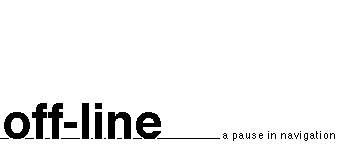I was having a pleasant dinner, last night, with
a few friends. People with many years of experience online –
from the old days when we were using other systems, because
there was practically no access to the internet outside a few
universities. One of them asked «well... so... why do we
need the internet?» and there was a moment of
embarrassment, because none of us had an easy answer. It’s
even worse for me, because I am writing a new book, that will
be published in November. This time it isn’t about business;
it’s meant to explain to people why and how it’s really
worthwhile to use the net. That seems easy; but it isn’t.
We are so overwhelmed with fantastic news about what the
net has to offer that we are losing track of what we can
really do with it. Does anyone really have the time to go
online just to look at again another picture of another
actress or model, more or less undressed? Or to see more
sites with lots of glitch and no content? Or to clutter the
bandwidth with more silly postcards? Or to "surf"
aimlessly looking for nobody knows what?
Yes, it would be nice if we could do all of our banking
online, without ever having to line up al a counter. But it
will take another while before the banks get themselves
organized. Yes, it would be even better if we could get rid
of all he waste of time and unnecessary procedure in public
offices. But it will take years for our bureaucracy to
unlearn its bas habits.
Yes, e-mail is the best tool we’ve ever had for
correspondence. Or it would be... if we could get rid of
spamming, monstrously bulky attachments, documents in formats
that are hard to decode, and many other problems caused by
the fact that people are taught masses of boring technical
stuff they don’t need and nothing about online manners and
practical use of the net.
Yes, it’s convenient to download software, music and all
sorts of interesting information. But the clutter is so big,
and the technologies so inefficient, that the task becomes
often cumbersome and uncomfortable. Yes, it’s nice to be able
to read a newspaper online. But I don’t know any living soul
that has replaced paper with the online edition – except
when people are away from home or looking for something in a magazine
they don’t usually buy. And many newspapers don’t provide
adequate access to past issues...
Is there a bit of nostalgia for the "old
days"? Yes, and it’s understandable. Things were more
simple, software worked better – and 2,400 bps connections
were much faster than any super-device available today. Even
then there were too many people online for us to be able to
know them all; but there was a mood of belonging, of mutual
help, that made us feel a bit special.
Maybe some of the people would have liked the net to stay
small, separate from the crowds. I never felt that way, nor
did any of my online friends. We wanted the net to grow and
expand, to open up to more people. Now it’s happening, and we
must learn to live with the consequences.
But it’s even more difficult for the newcomers. How do
they find their way? How do they tailor the net to their
personal needs and wishes?
The basic answer, I think, is simple. Don’t use the net
unless you know why. Don’t go online without a precise
objective. Don’t sit in front of a monitor, put your fingers
on a muse and a keyboard, unless you have a specific reason
for doing so. If we stop for a moment and think, to
understand our intentions and desires, we shall use the net
more effectively and waste less time. Of course that’s sooner
said that done – but I think it’s a good starting point.
The same idea works for companies. When there was no
internet, and I worked in other forms of communication, often
I forced myself and my partners to answer a tough question.
What would happen if we didn’t do this, if we didn’t spend a
penny? Sometimes my honesty was punished, because our client
found out that he didn’t have a clear objective and canceled
the investment. More often it was rewarded, because it helped
us to be much more effective and productive.
I believe there would be considerable improvement if
everyone used some quiet time in the summer holidays to think
about a simple but serious question. «What would happen
if we weren’t online? And if we are, what exactly are we
trying to do?» From what we can see, nine tenths of the
clutter online are caused by organizations and people who
never asked themselves that question – or didn’t find the
right answer.



